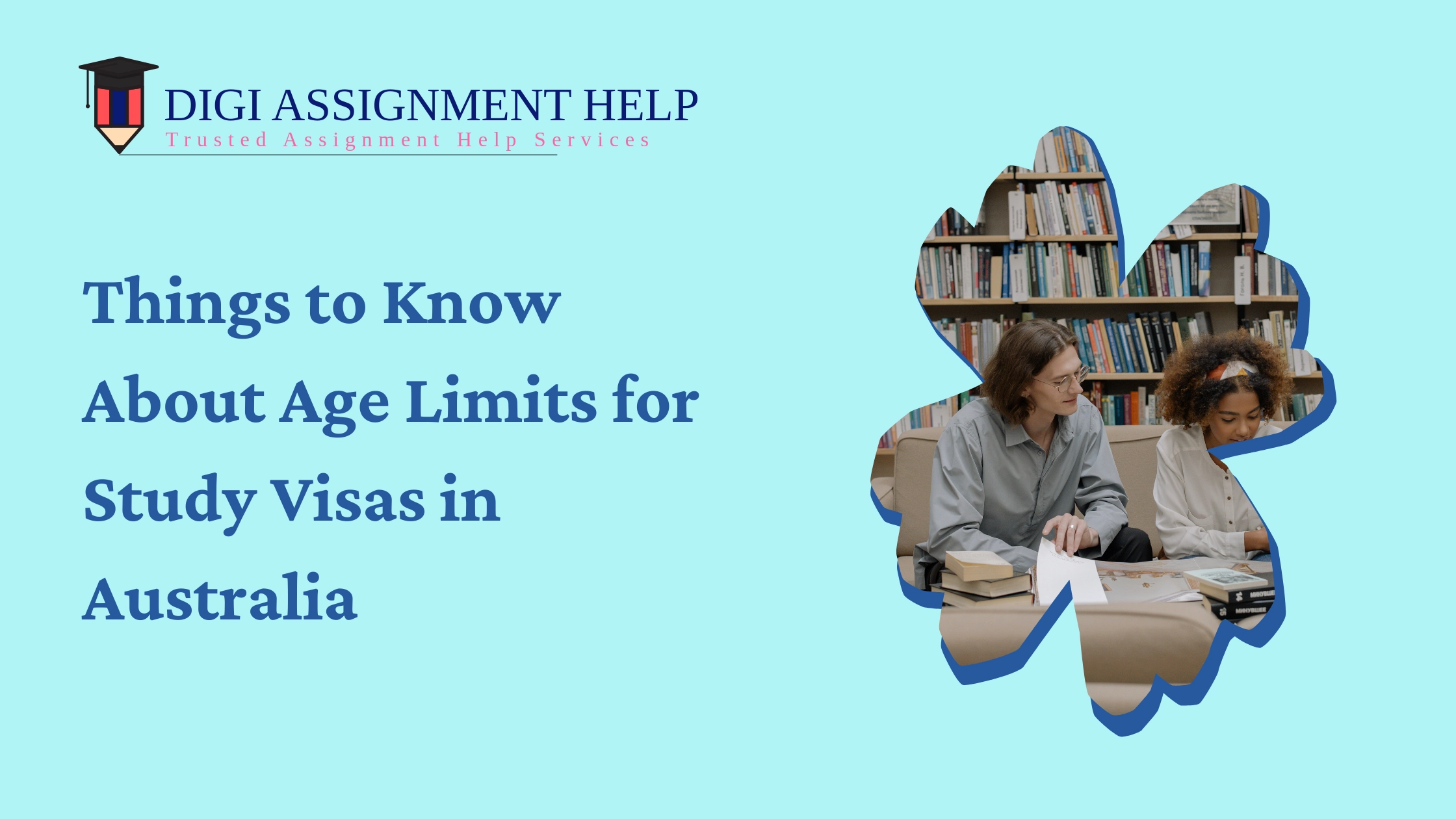Things to Know About Age Limits for Study Visas in Australia
 12-Jul-2024 09:14 AM
12-Jul-2024 09:14 AM

Home to some of the finest educational institutions in the world, Australia is a preferred destination amongst international students. This blog clarifies the age limits for Australian student visas, explaining the requirements in simple terms. This will help you in your education planning for Australia.
What is the Australian Student Visa?
One needs to know what an Australian study visa entails before we dive into the age restrictions. The student visa (subclass 500) is the most common visa international students hold in Australia. This allows you to stay in Australia for the duration of your study course, a maximum of five years. It also allows you to work part-time when you are studying and full-time during your school breaks.
General age requirements
The person applying for a student visa (subclass 500) to study in Australia does not have an age limit. If you fulfil the rest of the criteria, you can apply for a study visa. For school students, undergraduates, postgraduates, or older adults back in school, it is the same. But there are a few peculiarities in terms of rules concerning different types of studies and timings.
Age Limit: For the Students of the School
Australia has age limits for students who want to study in schools.
Kindergarten and grade school: If they are aged 5 to 10 and in Years 1 to 6, a primary school student cannot remain in Australia for longer than two years on the student visa.
Requirements for secondary school students (years 7–12), rules are a bit looser, as follows:
-
You will be in Year 9 by the time you are still not even 20.
-
Before your 21st birthday, you begin Year 10.
-
Commence Year 11 prior to the age of 22.
-
Begin Year 12 before you turn into Year 13.
College and TAFE students
1. There is no age limit if you plan to attend university or pursue vocational education. As long as you meet the coursework and visa requirements, you can apply for a visa to study at any age.
2. Postgraduate research students: There is no age limit when it comes to pursuing a Master’s in research or a PhD. Australia welcomes research students of any age, including mature-age students who make valuable contributions to their research.
3. English language intensive courses for overseas students: If you want to study in an ELICOS group, your visa does not have an age restriction.
4. The student guardian visa 590: Australian visas also have age restrictions on guardians. The 590 Student Guardian Visa is for a parent or a legal guardian of a student who is under 18 years of age. You must be at least 21 years old and provide accommodation, welfare, and financial support.
While many visas have no specific age limit, there are other practical points to consider. Some courses might be more geared toward younger or more mature students. Health insurance providers charge an extra premium for older students. So be prepared to budget for health insurance.
If you are returning to study later in life, be sure the course content aligns with your career goals. Moving to a new country and culture is challenging, so prepare to move.
Other important points to consider include:
-
A complex visa application process. You apply for a student visa. Ensure you have all the required papers. They must provide evidence of enrollment, sufficient funds, and English proficiency.
-
There are many services available in Australia on the campuses of various institutes. For international students, this support includes academic assistance, counselling, and career advice. Increase your chances of success with these resources.
-
But you need to realize that there are legal responsibilities. You are the holder of a student visa. This involves maintaining a high GPA. You should also abide by visa regulations and notify your education branch of any change in contact information.
-
You also get ample opportunities to immerse yourself in the culture. Enjoy the cultural diversity. Discover the natural beauty of Australia and make new friends.
Age considerations are specific to the courses. It varies by course.
-
Undergraduate students may be eligible for many programs as well. They are also open to students of all ages. In contrast, some courses, such as performing arts or sports, have a younger age preference because of physical demands.
-
Postgraduate study comprises Master's and PhD programs. Older students are often appreciated for their varied views. One thing these programs take very seriously is life and work experience. Last week, a police officer was awarded extra credit at the University of Maryland for his veteran status. Make all your experiences count.
-
Many VET courses provide skills in very practical fields. They are for specific jobs. Fortunately, these courses are available to all ages, and therefore they represent a perfect option for changing careers or acquiring new skills later in life.
In-Person, Age Cap, and Part-Time Analysis
Specific students take a few hours off part-time. This is often the case for those who have to juggle an education with work or family. The Student Visa (subclass 500) usually requires you to undertake full-time study, however, there are some exceptions:
1. You might be able to study part-time in a few cases. Such circumstances might mean having health problems or responsibilities to care for other people. Your school will also need to approve. Next, you need to notify the Department of Home Affairs.
2. Many institutions have extended their online study options, especially because of COVID-19. You will still need to meet visa criteria.
However, there is always some flexibility in the study options. This can be particularly useful for students in upper-grade levels or who have unique needs.
Awards and funding
All students need money. Australia offers various scholarships and aid.
-
Australia provides government scholarships based on the Australia Award for students from developing countries to undertake full-time undergraduate or postgraduate study at participating Australian universities.
-
Institutional Scholarships: Australian universities and colleges mostly also provide scholarships. Some are awarded based on academic performance or financial need, some for particular fields of study. Many universities now offer scholarships, so visit the websites of the institutions you are interested in.
In addition to the Australian government scholarships, there are also private and international groups that offer grants for study in Australia.
These are some of the opportunities you can use to understand which ones fit your profile to gain financial support.
Employment Opportunities
Australia is also very affordable for students to live in, and of course, you can work while studying if your budget does not permit welfare.
-
Part-time work: up to 40 hours every two weeks while the semester is in session and unlimited during scheduled breaks. This will give you more time to see your funds through the financial jungle.
-
Internships and Work Placements: Some courses have work placements included as part of the curriculum. These offer work experience and can boost your job prospects after you graduate.
-
Post-Study Work Visa: After completion of your studies, you might apply for a Temporary Graduate Visa (subclass 485) that will allow you to stay and work in Australia full-time for up to four years, according to your graduation level.
Living in Australia
Life in Australia is not just about academics. Follow this advice to find some balance:
-
Accommodation: Get to know some kinds of accommodations, such as university housing, private rentals, and homestays. Live within your means and maximize your lifestyle.
-
Healthcare: All international students must have Overseas Student Health Cover (OSHC). This covers your medical costs during your stay in Australia.
-
Public transport: Most of the cities in Australia have good public transportation. Learn as much about local transport options such as buses, trains, and trams as you settle into your new environment.
-
Cultural Adjustment: Accepting the numerous cultural backgrounds in Australia in your free time, use this opportunity to take part in cultural events or clubs and make friends with people from other backgrounds.
Australia is a safe country but always check the local safety signs. Please listen to and follow the advice of your school or campus assistance to stay safe.
Conclusion
The possibility of obtaining a student visa is available for students of any age. School children are limited to a particular age. This is not true for higher education and vocational courses, which accept learners of whatever age.
Knowing the visa requirements and basic things about Australia will help you make proper plans for studying there. Now that you have learned all about the methods and what Australia has to offer, it’s clear why being a young student or mature learner in Australia is beneficial for your education.
Think about things such as the suitability of coursework, the availability of health insurance, career goals, and also culture shock. They will assist you in achieving the most from your time studying at AU.
Make sure to enjoy the assistance, scholarships, and employment opportunities that are offered, particularly for international students, to guarantee a great educational experience.
Digi Assignment Help experts provide online assistance for any part of your study journey, including university assignments and homework help.
Top Blogs
|
What Is Algebra Calculator And How To Use It
|
||
|
What Are The Top Professional Careers For Bachelor Of Engineering Graduates? |




























 +44 74 8881 8568
+44 74 8881 8568